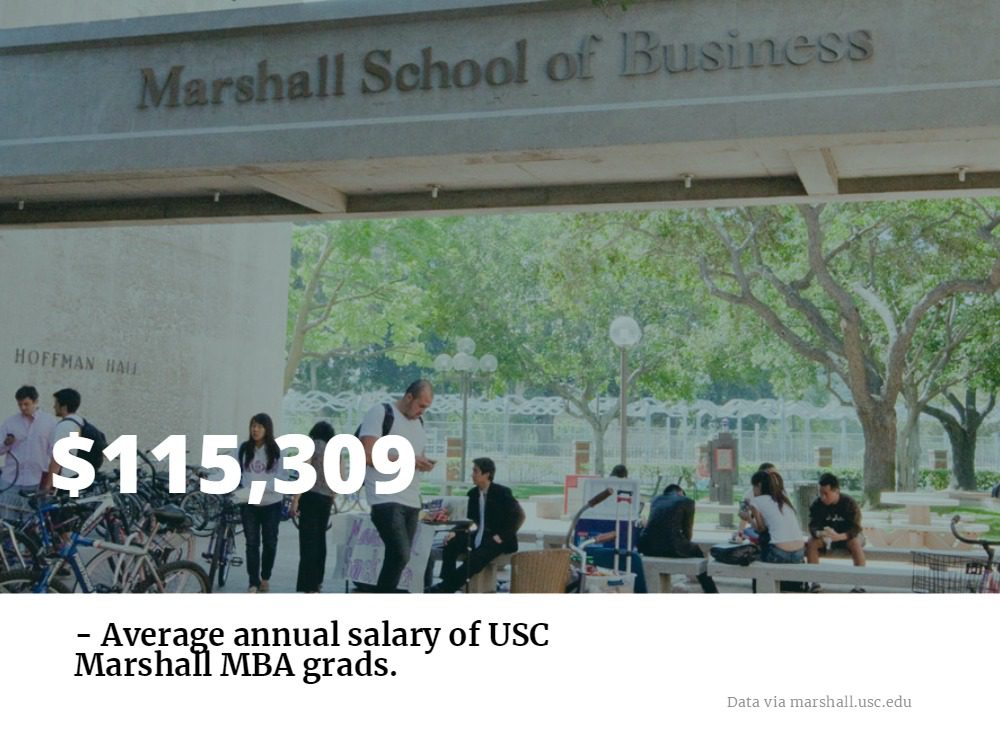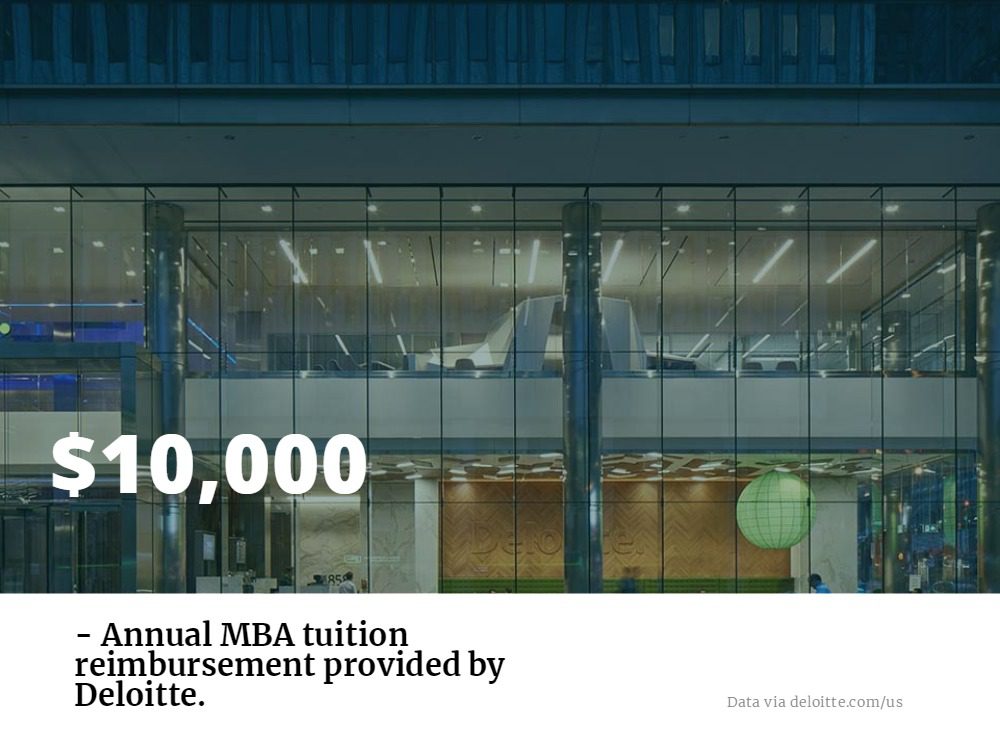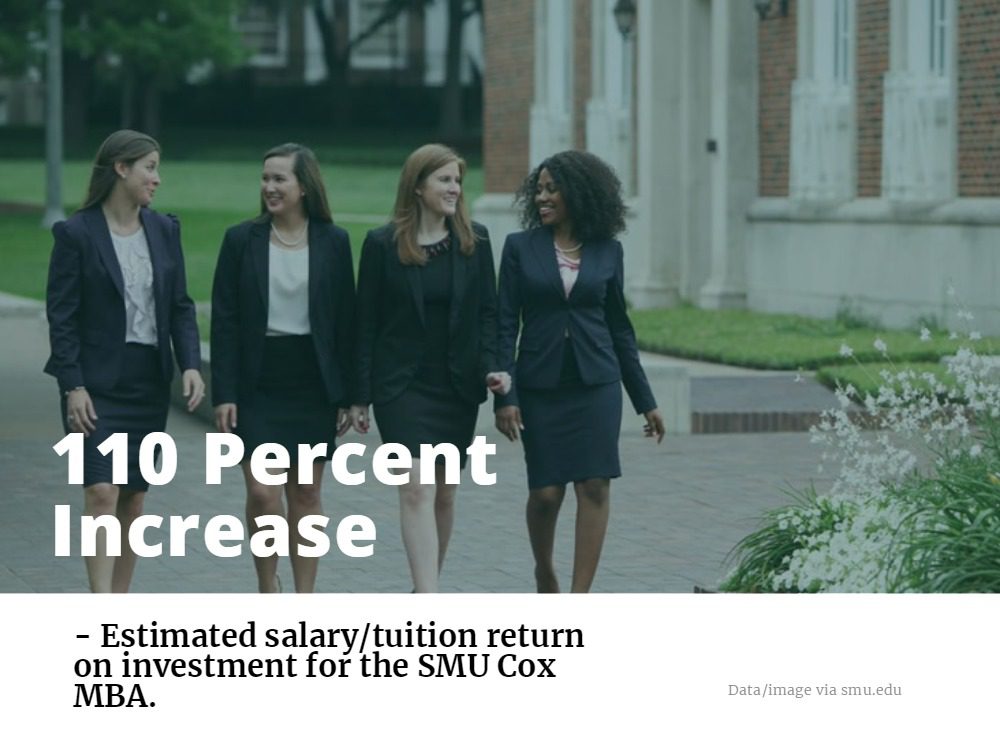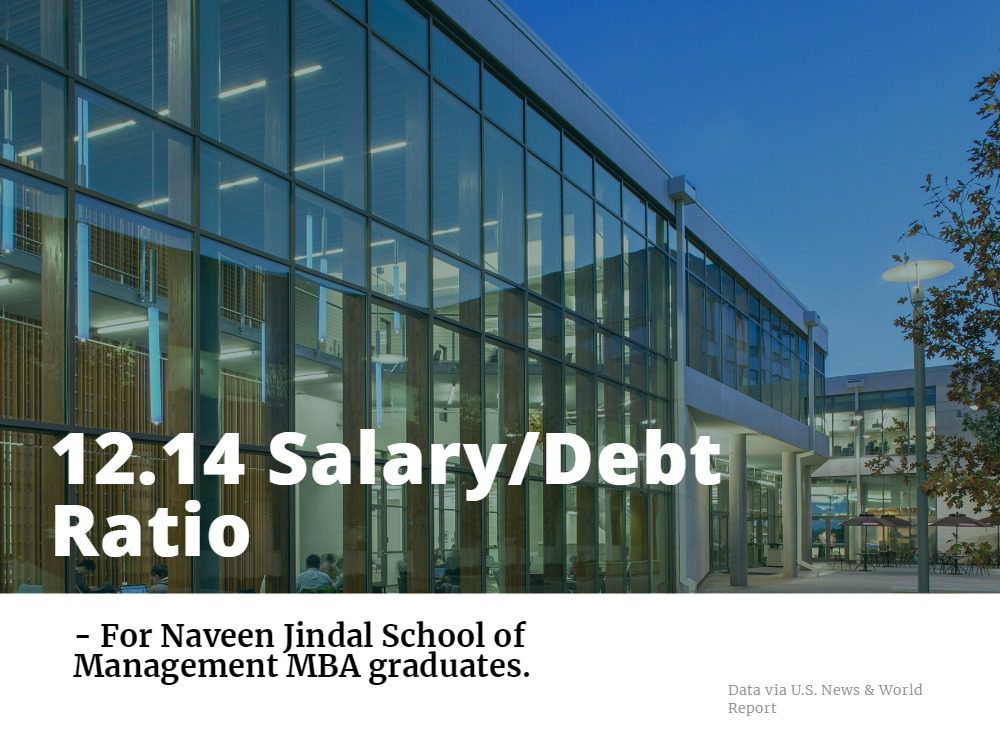The Best Long Angeles MBA Return on Investment Bets

Return on Investment (ROI) is one of the most important factors a prospective MBA can take into consideration when choosing the right business school.
Of course, the true value of each MBA program may ultimately be something impossible to measure. The kind of connections made through professional networking, the soft skills that students attain which help them navigate through both their personal and professional life—these aren’t things that can be easily quantified. But, thankfully, factors like average salary increase, rate of post-graduate employment and the overall tuition of a program are. And these numbers can help students start to better see an overall picture of what each MBA is worth.
The Best Long Angeles MBA Return on Investment
The Marshall School of Business – USC
The Marshall School of Business at the University of Southern California is consistently one of the top ranked MBA programs in the state of California and even throughout the country. Specific ROI aside, these sorts of honors should also be a factor when considering the overall value of the program: for example, Marshall has been named the third best program for “Most Satisfied Business School Graduates” by Forbes and sixth on The Economist’s ranking of “Best Alumni Networks.”
Based on tuition for the 2017-18 school year, the total expense (tuition, fees and living expenses included) to pursue a full-time MBA at Marshall would be $95,881 for the first year and $82,522 for the second, for a total of $178,403.
Now take into consideration the fact that the average salary for graduates of Marshall’s full-time MBA program within three months of graduation is $115,309, and that the large majority of job offers (38 percent) for MBA students came from on-campus recruiting or job postings through the university. The second highest source of employment (21 percent) came from internships held while in the MBA program. Furthermore, a number of top organizations—such as Apple, AT&T, and Walt Disney Studios—hired the graduates of Marshall’s 2016 MBA class. All of these factors boost the overall ROI of Marshall’s program, making it one of the top valued programs in L.A.—even with the high price tag.

Anderson School of Management – UCLA
The Anderson School of Management at UCLA is another program which offers a high ROI when considering the types of opportunities and salaries available to students after graduation. While the tuition cost is certainly high—roughly $194,220 (including fees and living expenses) for the the two years of the program, the benefits to students are undeniable.
A look at the full-time employment report for the most recent MBA class finds that 92.4 percent of students were offered full-time employment within just three months of graduation, with 87.7 percent acceptances. By far (72.2 percent) , students found their employment opportunities through Anderson-facilitated resources, such as internships, on-campus recruiting, or from UCLA Anderson alumni and classmates.
The salaries for graduating Anderson students also reveals a positive trend: the average post-graduate compensation was $118,150, with 70.6 percent of students earning signing bonuses of up to $89,500. The connections sewn by Anderson internships and alumnae also reveal a significant payoff in the types of organizations hiring Anderson alum: companies like NBC Universal, IBM, Barclays, Google, and other major corporations now have Anderson MBA graduates on staff.
The Paul Merage School of Business – University of California, Irvine
The UC Irvine Paul Merage School of Business is one of the top business schools in the Los Angeles metro area, as evidenced by its consistently high rankings from various publications, such as the Financial Times and U.S. News & World Report.
With the program’s recognition for its high lifetime earnings combined with the relatively low cost the degree, it’s no surprise that that the program at UC Irvine produces a high return on investment. The estimated total annual cost of an MBA at Merage ranges from $67,422—$83,967, depending on if you whether or not you are a resident of California and whether or not you will be using campus. This is compared with an average post-graduate salary of $97,808 for the 2017 graduating class. About 50 percent of all students were employed by graduation, and 81 percent held full-time jobs within three months.
Graziado School of Business and Management – Pepperdine University
One of the reasons Pepperdine’s Graziado School of Business boasts such a high return on investment is the many different formats in which students can pursue a full-time degree. With the opportunity to take the full-time MBA over the course of 12, 15, or 20 months, the Graziado MBA typically costs less overall ($74,250 for the 12-month program, $99,000 for all others) and means less time away from a full-time paycheck.
Combine this with the success rate of 82 percent of students accepting job within three months after graduation and a $120,000 starting salary (at highest), and its understandable why Graziado graduates find incredible value in their degree.
How to Get Your Employer to Pay For Your MBA

Earning an MBA holds tons of value in the business world—an advanced business degree can open doors that may otherwise have been closed, and boasts a high return on investment thanks to the top-level salaries that MBAs command.
Graduate school—and all of the coursework that comes with it—can be an intimidating challenge, but paying for it doesn’t have to be. Aside from scholarship, grant and fellowship opportunities at business schools across the country, more and more companies are placing a higher importance on tuition reimbursement programs, and expanding opportunities for paid MBA tuition reimbursement.
How can you get your employer to pay for your MBA studies? Let’s take a closer look.
Getting Your Employer to Pay For Your MBA
First thing’s first: You need to find out if your current employer offers tuition reimbursement to its employees. The terms of reimbursement vary depending on the company, with some corporations not offering any sort of program at all. Those that do offer some sort of compensation may do so on a course-by-course basis, or as a lump-sum reimbursement package for coursework in relevant degree plans.
“Organizations typically support MBA pursuits for two reasons,” J. Todd Rhoad, managing director of Atlanta’s BT Consulting, told USA Today. “Employee development and succession planning. In the first case, companies support the cost of MBA programs as part of their commitment to employee training and development.”
If you want to convince your employer that your education is worth investing in, you’ll need to show that earning an MBA will further your business acumen and understanding of your industry, and ultimately help your company reap those benefits.
“Usually, an employee has to already been delivering great results within the company,” Roderick Lewis, international relations director at the ISCTE Business School, University Institute of Lisbon, told Business Insider.
“If you haven’t already convinced your company, then asking them to [sponsor your education] becomes really difficult,” Lewis says.
USA Today also outlined a few checkboxes to hit when determining how valuable earning an MBA would be for your organization:
- Do current members of middle or upper management hold advanced business degrees?
- Does your company have the available revenue to invest in employee education?
- Would someone with the type of advanced training you seek bring clear advantages to the company?
If those point hold true in your situation, then start researching which programs specialize in providing the skills that your company needs. Keep in mind: You do not have to limit yourself to business schools in your metro thanks to popularity of Online MBA programs. There may have once been a stigma against online programs, but the of the matter fact is that many of the top online MBAs on U.S. News & World Report’s annual rankings also rank highly on the publication’s top campus-based graduate business programs list.
Some of these schools include:
- University of North Carolina – Chapel Hill (Kenan-Flagler)
- Indiana University – Bloomington (Kelley)
- Temple University (Fox)
- Arizona State University (Carey)
- University of Florida (Hough)
- Carnegie Mellon University (Tepper)
- University of Texas – Dallas
Once you’ve found the right program, you’ll want to craft a brief proposal for your employer. In it, you’ll want to mention how you fit the company’s tuition reimbursement policy, and list the advantages that continuing your education can bring you and your company. Don’t shy away from providing data on how much assistance you may need and how this investment will pay off for everyone, while also ensuring your employer that you’ll remain committed to the company during your degree program, or won’t jump ship after earning your degree.
“A proposal should address the benefit to the company,” Rhoad says, “(including) areas where the company could improve and how you will help them, a review of the courses to be taken and how they will provide knowledge that can help improve the company’s performance.”
Companies That Provide MBA Tuition Reimbursement
Investopedia recently compiled a list of companies have stated that they place a high value on their tuition assistance benefits, and provide tuition reimbursement for the educational costs of an MBA.
According to Investopedia, consulting companies lead the market in tuition reimbursement programs for MBA courses. These firms also pay the highest salaries for MBA alumni. Deloitte has the most robust tuition reimbursement plan, providing employees with up to $10,000 per year in MBA reimbursements. The firm requires two years of work with the company and a commitment to work for the company after graduation in order to receive the tuition assistance benefit.

Financial institutions and banks also place a high value on employees with MBAs, and provide tuition assistance. One example is Bank of America, which provides employees with annual tuition assistance of up to $5,250 for advanced degree coursework. Wells Fargo also has a track record of paying for MBAs, doling out up to $5,000 annually for tuition expenses.
The booming tech sector is also hiring MBAs left and right, with some firms developing their MBA talent in house by offering to pay MBA tuition expenses. Apple tops the list of tech companies offering tuition assistance, providing reimbursement of up to $5,000 annually. MBA degrees are even more coveted in the the specialty defense technology sector, as Raytheon, one of the top defense technology companies in the world, offering to pay up to 100 percent of employees’ college tuition for graduate school.
Other leading companies offering tuition reimbursement to employees include:
- Chevron: A market leader in the energy sector, Chevron offers offers tuition reimbursement of up to 75 percent for its employees.
Ford: Ford’s education tuition assistance program provides employees with tuition reimbursement of up to $5,000 annually for an MBA. - Procter & Gamble: This firm has one of the leading tuition reimbursement benefits in the consumer goods industry, providing reimbursement for up to 80 percent of educational costs with a limit at $40,000.
- AT&T: This telecom giant provides employees with up to $5,250 annually for tuition assistance, for a maximum reimbursement of up to $25,000 for graduate school courses.
Finding the Best Return On Investment for Your MBA: Dallas

Choosing the right MBA program can feel overwhelming. With nearly 800 accredited business schools in the United States, the idea of wading through the information on every program is intimidating to say the least. A variety of features, such as a school rankings, internship opportunities, and an extensive alumni network may be huge factors where you choose to earn your master’s. But one of the most important variables to consider is a program’s return on investment (ROI). It is essential to pick a school with an enviable ROI, as this will ensure that the time and money you dedicate to earning your MBA are not for naught. Given the considerable cost of higher education, it is important to attend the school that will give you the most bang for your buck.
The Best Dallas MBA Return on Investment
Cox School of Business – Southern Methodist University
At the SMU Cox School of Business, students can expect an admirable rate of return on the cost of education. The tuition rate of $45,976 per year for the two-year program is among the most enviable in the U.S. The average graduating salary for MBA’s was $96,587, which is more than double the yearly cost of tuition. This school is also ideal for students hoping to global perspective, as students at Cox have the opportunity to participate in an international MBA exchange program, which allows them to continue their education in Latin America, Europe, Australia, or Asia. Simply put, SMU Cox doesn’t just provide one of the best Dallas MBA return on investment opportunities, but one of the best in the country overall.

Hankamer School of Business – Baylor University
Baylor’s Hanker School of Business is another excellent option for students seeking a respectable ROI. The full-time program can span from 16 to 21 months, with a tuition of $20,597 per semester (over about three to four semesters, depending on course load and core requirements met during undergrad). According to Hankamer’s website, the average starting salary for MBA graduates in 2017 was $73,314. Additionally, Hankamer’s Career Management team is nationally-ranked, and can provide extra support for students seeking help with job placement.
McCombs School of Business – University of Texas at Austin
The MBA program at the McCombs School of Business currently costs $30,750 per semester, bringing the total tuition to about $123,000. The cost will is steeper for non-residents (closer to $189,000). Though the cost of tuition at McCombs is nothing to sneer at, neither is the reward. In fact, the most recent MBA class had an impressive average starting salary of $117,068. McCombs, which is also one of the largest business schools on this list, also has an extensive alumni network, which includes the CEOs of Southwest Airlines (Gary C. Kelly) and Heinz (William R. Johnson).
Naveen Jindal School of Management – University of Texas at Dallas
Like many of the schools we mentioned on this list, the Naveen Jindal School of Management has a solid track record when it comes to ROI. Tuition for the full-time MBA program is just $32,998 for in-state residents and $64,332 for non-residents. In addition to the reasonable cost, the school’s website states that 80 percent of students receive scholarships that cover an average of 45 percent of the total program cost. In 2017, U.S. News & World Report stated that the school’s MBA program, “… had the highest salary-to-debt ratio among ranked business schools.” According to the article, average starting salary for graduates (of those who were employed within three months of graduation) was $86,644.

Neeley School of Business – Texas Christian University
At TCU’s Neeley School of Business, the average starting salary for the most recent graduates of the full-time MBA program was $93,093, surpassing the total tuition of $88,020. Moreover, Neeley boasts a 92 percent employment rate 90 days after graduation. Recent graduates have taken jobs at renowned companies like Ernst & Young and IBM. In addition to standard core classes, Neeley introduces a great deal of experiential learning into the curriculum. At the end of their first year, students participate in an Integrative Project that offers them the opportunity to apply their skills to real-world business obstacles via a week-long simulation.
DeGroote Business Looks Back on Successful 2017, and its Future

The MBA program at the McMaster University DeGroote School of Business is changing the game for prospective MBAs in Canada, offering a valuable return on investment, strong network of partners and alumni, and diverse student body.
Since 2010, the school’s full-time and co-op MBA programs have been based at McMaster’s Ron Joyce Center, transforming into a top-rate business education at one of the highest-ranked universities on the planet. In fact, the 2017 Academic Ranking of World Universities named McMaster the 66th best university in the world. Today, the Ron Joyce Center is not just home to DeGroote’s MBA program but also to the school’s Health Leadership Academy (HLA), Executive MBA in Digital Transformation (EMBA), and Digital Transformation Research Centre.
YOU MAY ALSO LIKE: What Are The Most Valuable Toronto MBA Programs?
DeGroote’s MBA program took another step forward just last year, when university staff and faculty took a deep look into best practices throughout North America to reform the MBA into an even more comprehensive business education. Inspired by insights from students, alumni and faculty, the program integrated features such as cohort classes, case studies, and a series of foundation weeks at the start of the program. “The foundation weeks, in particular, introduce critical business skills and principles to new students at the outset of the program,” commented Will Weisner, Director of the MBA program at DeGroote. “As a result, students begin their MBA journey with the foundation to succeed in the classroom, at their co-op jos, and in their leadership and networking activities.”
The numbers don’t lie when it comes to return on investment: something we’ve previously noted in our highlight of the most valuable Toronto MBA programs. In 2016, 102 students graduated from the co-op stream, earning an average of $71,930 after joining the workforce. For the 84 students graduating from the full-time MBA, the average salary $60,125.
There’s more exciting developments for the DeGroote MBA in 2018 as well. Currently, the school is reviewing proposal for a part-time blended MBA that would offer a blended learning experience combining both online and in-residence components. You can read more about whats in store at DeGroote here.
USC Marshall Professor Explains the Return on Investment of Gratitude

Glenn Fox, the Head of Design, Strategy and Outreach for USC Marshall’s Performance Science Institute, believes that being thankful comes with a significant return-on-investment in business. According to a press release, Fox has focused his latest research on correlating gratitude and human performance. Continue reading…
What Are The Most Valuable Toronto MBA Programs?

For prospective MBAs, looking at the price tag of earning a degree can be startling- and may even deter talented business leaders from pursuing an advanced education. The fear is certainly justified: an MBA from some of North America’s top business school can reach upwards of $100,000.
Yet, when considering the well-recorded increase that most professionals witness in their salary after earning an MBA, along with a greater likelihood of finding employment, the seemingly impossible cost of an MBA can seem more within reach.
Factors like the cost of a degree, salary increase after graduation and employment rate of graduates are all key numbers that must be considered together before one can determine the true cost of a degree. Below, we take a glance at these different numbers and round up the Toronto MBA programs that provide the best return on investment.
Ivey Business School – Western University Canada
The Ivey Business School at Western University Canada MBA program began in 1950, and has since established itself as one of the best offerings in the world. The business school’s rich legacy has been recognized again and again by the likes of Bloomberg, which touted its MBA as the 11th best international MBA program in 2017. Ivey, with its main teaching center on Western University’s campus in London, Ontario, offers a variety of MBA experiences, such as an full-time, Accelerated, and Executive MBA. The Tangerine Leadership Centre in Toronto’s downtown business district also offers EMBA courses through the Ivey Business School.
The full-time MBA at Ivey is a 12-month program that costs $88,250 to attend for domestic students and $101,500 USD for international applicants. According to the most recent Ivey employment report, about 91 percent of the 169 students in the Class of 2017 earned a job opportunity shortly after graduation, reporting an average salary of $103,560. More than one-third of the Class of 2017 also earned a singing bonus upon employment with a median value of $15,000. Signing bonuses for Ivey MBA grads ranged as high as $45,000 alone, proving that even with high price tag, the degree can immediately pay off.
Ivey Return on Investment (In USD)
| Ivey MBA Tuition | Median Signing Bonus | Median Annual Salary |
|---|---|---|
| $88,250 | $15,000 | $103,560 |
Schulich School of Business – York University
The Schulich School of Business at York University offers students a number of ways to pursue an advanced business education, from full-time, Executive, and International MBA programs as well as offering Master’s degrees in accounting, finance, business analytics, and more. The Schulich International MBA is the first of its kind in Canada, and the Kellogg-Schulich Executive MBA is North America’s first ever cross-border executive MBA degree. However, length of programs should be taken into consideration, since it will determine the time without a full-time income; an important distinction for students that are looking to enter the workforce as soon as possible. At 16-20 months, an MBA at Schulich will take slightly longer to earn than year-long programs like at Ivey.
Roughly 89 percent of graduates from Schulich’s MBA programs find a job within three months, earning an average base salary of $91,860 USD and an average singing bonus of $12,050. Full-time MBA students at Schulich will pay a tuition of $77,900 during the life of the degree, while part-time students pay $81,000. Meaning, grads typically earn about $10,000 more in their first year of employment than the entire cost of the program.
Schulich Return on Investment (In USD)
| Schulich MBA Tuition | Median Signing Bonus | Median Annual Salary |
|---|---|---|
| $77,900 | $12,050 | $91,860 |
Rotman School of Management – University of Toronto
The Rotman School of Management at the University of Toronto can boast of origins dating all the way back to 1901, when the university first established a diploma program in commerce. By 1972, the School of Business was an official part of the university, and hasn’t stopped growing since. Today, the Rotman School of Management has become universally recognized by the likes of Financial Times the and Bloomberg as one of the best business schools in the country. Located in downtown Toronto, Rotman offers a two-year, full-time MBA degree, but also more flexible options such as part-time morning and evening MBA programs, executive MBA, and an 18-month Global Executive MBA.
The two-year, full-time MBA tuition at Rotman comes with a price tag of $101,350 CAD ($74,999 USD). However, graduates—80 percent of whom typically find employment within three months after earning their degree—saw a median base salary of $85,000 and median signing bonus of $13,500. This salary increase seems to be typical of MBA graduates in Canada, so considerations of employment rate and program duration may be most important when evaluating Return on Investment for top programs in Canada.
Rotman Return on Investment (In USD)
| Rotman MBA Tuition | Median Signing Bonus | Median Annual Salary |
|---|---|---|
| $74,999 | $13,500 | $85,000 |
